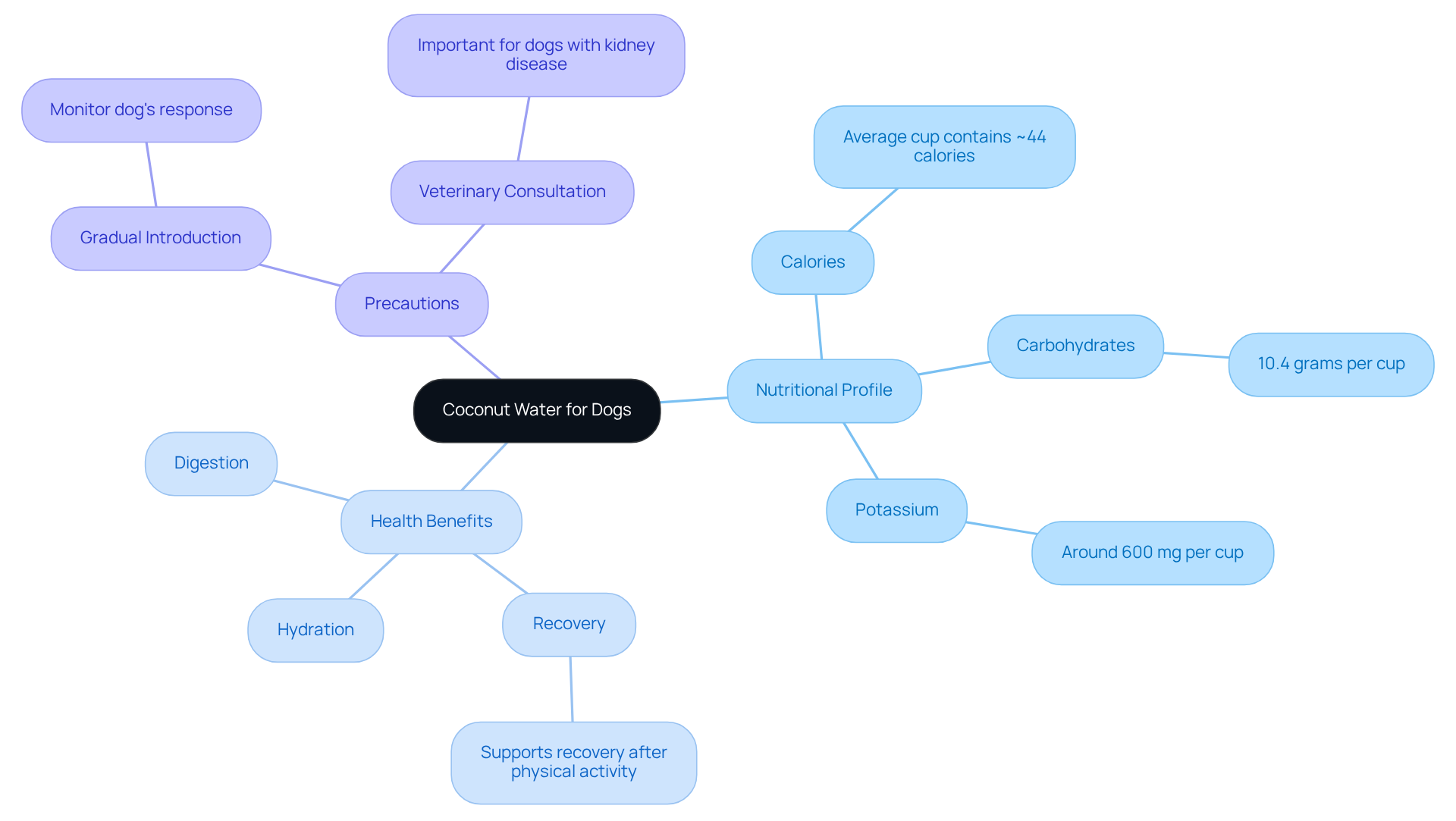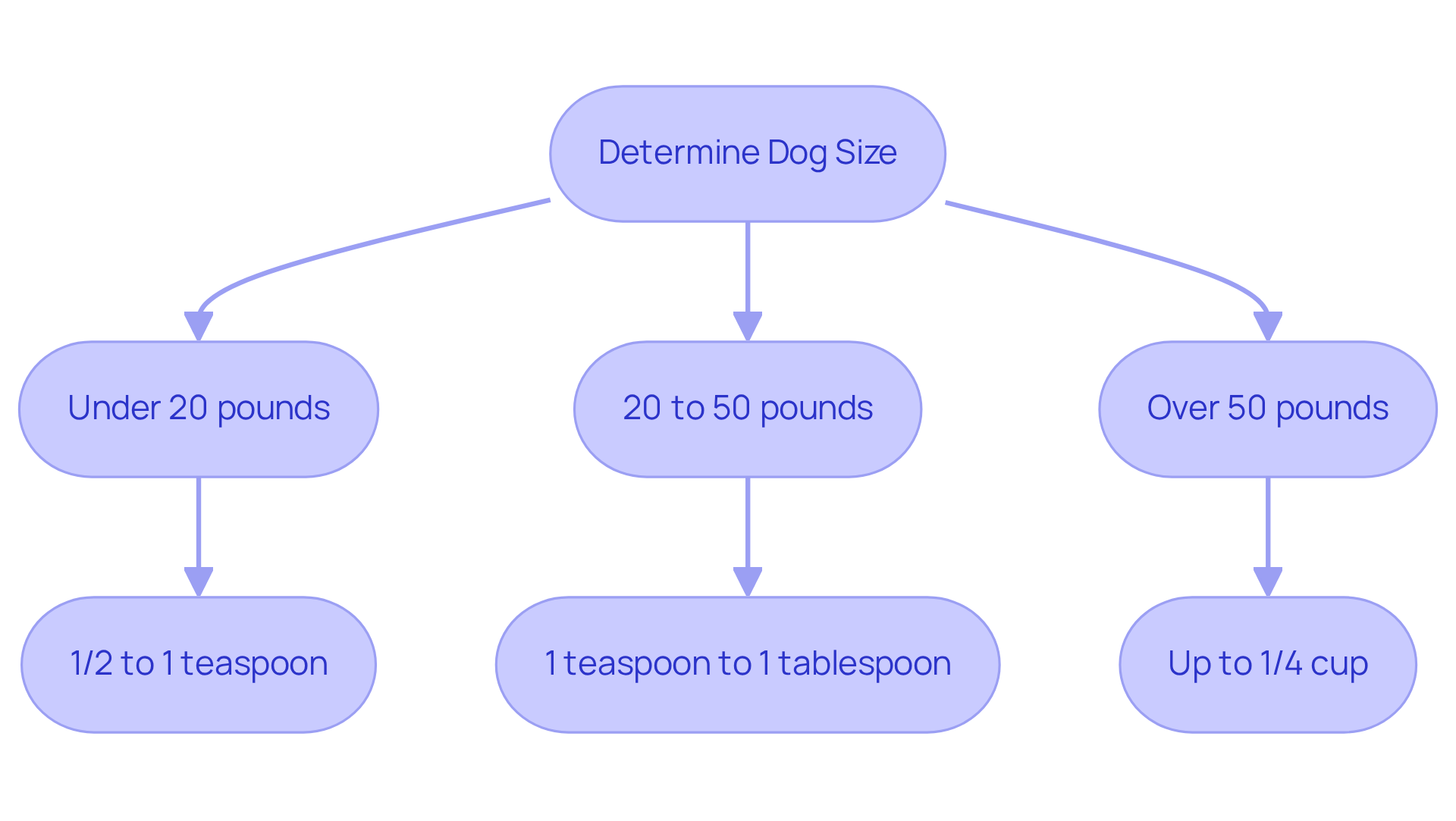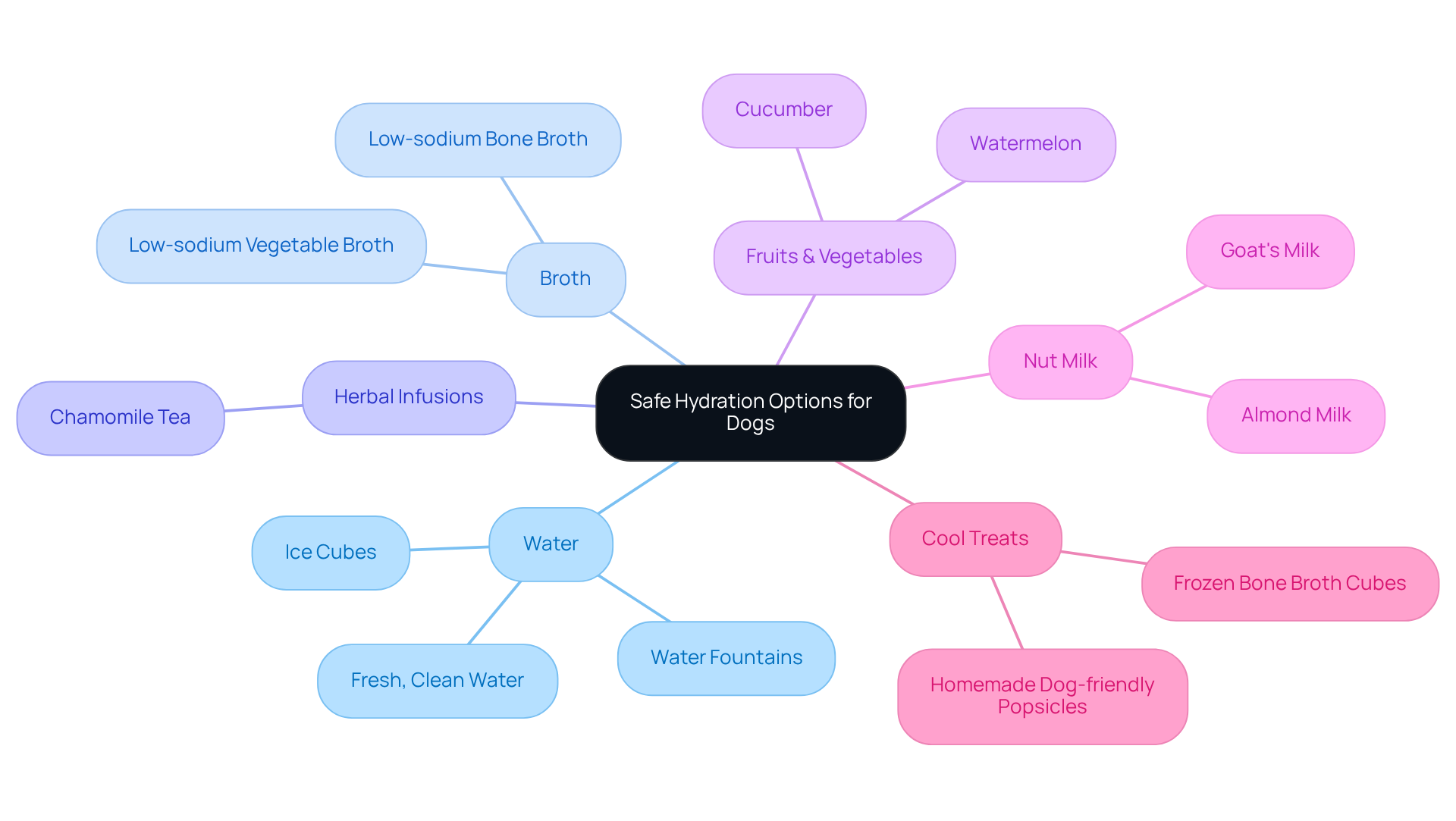Can Dogs Drink Coconut Water? Safety, Benefits, and Serving Sizes
Overview
As a loving pet owner, you may wonder if your furry family members can enjoy coconut water. The good news is that dogs can drink coconut water in moderation as a refreshing and hydrating treat. However, it’s essential to remember that it should not replace their primary water source.
To ensure a safe introduction, consider the following:
- Gradually add coconut water to their diet.
- Monitor for any adverse reactions.
- Consult with your veterinarian, especially since the high potassium content can pose risks for some dogs.
Your pet’s health and happiness are our top priority, and we encourage you to make informed choices for their well-being.
Introduction
The refreshing taste of coconut water has made it a popular choice for hydration, but as a caring pet owner, you may wonder if it’s suitable for your furry family members. Packed with essential electrolytes and low in calories, this tropical beverage offers potential benefits for dogs, especially after exercise or during hot weather. However, the question remains: can dogs safely enjoy coconut water without risking their health? This article delves into the safety, benefits, and appropriate serving sizes of coconut water for dogs, ensuring that you can make informed decisions for your beloved companions.
Explore Coconut Water: Definition and Nutritional Profile
The clear liquid found inside young fruits of the palm, often questioned as to whether can dogs drink coconut water, is celebrated for its refreshing flavor and hydrating qualities, making it a wonderful choice for your furry family members. This nutrient-rich beverage is low in calories, with an average cup containing approximately 44 calories, 10.4 grams of carbohydrates, and around 600 mg of potassium. These vital electrolytes, including magnesium and calcium, play an essential role in sustaining fluid balance, especially after intense physical activity or during hot weather.
Studies show that palm juice can efficiently assist in moisture replenishment, leading pet owners to wonder if can dogs drink coconut water to improve their fluid consumption. For instance, case studies exploring whether can dogs drink coconut water highlight its benefits in recovery after physical activity, showcasing its potential to support digestion and overall well-being. However, it’s important to gradually introduce the liquid from the fruit of the coconut into your dog’s diet to see if can dogs drink coconut water. This allows you to monitor their response and ensure it complements their hydration needs without replacing plain water as their primary source.
Additionally, consulting a veterinarian is essential, particularly for dogs with specific health concerns, such as kidney disease, as the potassium content may pose risks in some cases. Furthermore, while exploring these nourishing options, be cautious with coconut shells, which can present choking hazards and cause dental fractures if chewed. By taking these steps, you can create a nurturing environment that supports your pet’s health and happiness.

Assess Safety: Health Benefits and Risks of Coconut Water for Dogs
Coconut liquid can be a wonderful addition to your dog’s diet, leading to the question of can dogs drink coconut water for hydration and replenishing electrolytes after exercise. However, it’s important to be mindful of its high potassium content. In excessive amounts, this can lead to hyperkalemia, a serious electrolyte imbalance. With approximately 60 calories per cup, coconut liquid should be given in moderation to ensure it doesn’t affect your dog’s daily caloric intake. Be cautious of certain commercial coconut products that may contain harmful additives or sweeteners, like xylitol, which is toxic to dogs. Therefore, choosing pure, natural coconut juice and introducing it gradually—starting with just a few ounces a day—is essential to monitor for any adverse reactions, particularly when asking if can dogs drink coconut water.
Veterinarians often suggest that while can dogs drink coconut water, it should be treated as an occasional treat rather than a regular part of your dog’s diet. While it can aid in hydration, especially on warm days or after vigorous exercise, it should never replace fresh water, which remains the best source of hydration for your furry family members. If your dog consumes too much, watch for symptoms like vomiting, diarrhea, or lethargy, which would require immediate veterinary attention.
Case studies indicate that while coconut liquid is safe for dogs in moderation, excessive intake can lead to serious health issues. For instance, one study noted that symptoms such as hives and seizures could arise, highlighting the importance of careful monitoring. Always consult with your veterinarian before introducing this tropical drink to your dog’s diet, especially if your pet has existing health concerns or is on medication. By prioritizing safety and moderation, you can enjoy the benefits of this delightful beverage while minimizing potential risks for your beloved pet.

Determine Appropriate Serving Sizes: How Much Coconut Water Can Dogs Have?
Introducing coconut water to your furry family member’s diet can be a delightful experience, but you should ask if can dogs drink coconut water in moderation. For small canines weighing under 20 pounds, it’s best to limit the serving to about 1/2 to 1 teaspoon. If you have a medium-sized dog, ranging from 20 to 50 pounds, they can safely enjoy 1 teaspoon to 1 tablespoon. Larger breeds over 50 pounds may indulge in up to 1/4 cup. Start with small amounts and closely monitor your dog’s reaction before gradually increasing the serving size. Remember, coconut fluid should complement, not replace, fresh water. On warm days, many people ask, can dogs drink coconut water as a wonderful occasional treat or hydration boost?
This thoughtful approach ensures your pet reaps the benefits of coconut water without the risk of digestive issues or excessive calorie intake. Additionally, you can offer this refreshing beverage in various forms—try blending it with their meals or freezing it into ice cubes for a revitalizing snack. Your dog will appreciate the care you take in enhancing their diet, and you’ll feel good knowing you’re providing something special.

Identify Alternatives: Safe Hydration Options for Dogs Beyond Coconut Water
Coconut juice can be a revitalizing delight for your furry family members, leading to the question of whether can dogs drink coconut water, but there are many other safe fluid options to consider.
- Pure water is the primary source of moisture, essential for sustaining healthy organ function and muscle performance.
- Low-sodium bone broth is another excellent choice, offering vital nutrients like collagen and amino acids that support joint health and digestion.
- Herbal infusions, such as chamomile, can provide soothing effects and hydration, while specially designed pet electrolyte solutions are beneficial for dogs recovering from illness or dehydration.
Fruits and vegetables with high water content, like watermelon and cucumber, can also help meet your dog’s fluid needs. These options not only keep your dog hydrated but also provide additional vitamins and minerals. Nut milk, such as almond or cashew milk, can be a suitable option for lactose-intolerant dogs. However, regular cow’s milk should be approached with caution due to potential digestive issues.
In hot weather, consider offering ice cubes or homemade dog-friendly popsicles to keep your dog cool and hydrated. Always consult with a veterinarian if you’re unsure about introducing new fluid options into your dog’s diet. Monitoring your dog’s fluid levels is vital, especially during warm weather or if they are feeling unwell. Signs of adequate fluid intake include moist pink gums, regular urination, and normal energy levels. By prioritizing safe hydration practices, you can help ensure your dog’s overall health and well-being.

Conclusion
Coconut water can be a refreshing and nutritious addition to your furry family member’s diet, offering hydration and essential electrolytes. However, it’s important to approach this tropical beverage with caution. Introduce it in moderation, ensuring it does not replace fresh water as the primary hydration source. Understanding the potential benefits and risks associated with coconut water is vital for maintaining your dog’s health and well-being.
Throughout this article, we highlighted the nutritional profile of coconut water, its benefits for hydration, and the necessary precautions for safe consumption. The importance of consulting a veterinarian, especially for dogs with existing health issues, cannot be overstated. Additionally, serving sizes should be tailored to your dog’s weight, ensuring that coconut water serves as an occasional treat rather than a dietary staple.
Ultimately, prioritizing safe hydration practices is essential for every dog owner. Exploring various hydration options—such as pure water, low-sodium bone broth, and hydrating fruits and vegetables—can enhance your dog’s diet while ensuring they remain healthy and happy. As a responsible pet owner, staying informed about safe hydration practices will significantly contribute to your furry friend’s overall well-being.
Frequently Asked Questions
What is coconut water?
Coconut water is the clear liquid found inside young coconuts, celebrated for its refreshing flavor and hydrating qualities.
Is coconut water nutritious?
Yes, coconut water is nutrient-rich, low in calories, and contains approximately 44 calories, 10.4 grams of carbohydrates, and around 600 mg of potassium per cup.
Can dogs drink coconut water?
Yes, dogs can drink coconut water, and it may help improve their fluid consumption, especially after physical activity or during hot weather.
What are the benefits of coconut water for dogs?
Coconut water can assist in moisture replenishment, support digestion, and contribute to overall well-being in dogs.
How should I introduce coconut water to my dog’s diet?
It is important to gradually introduce coconut water into your dog’s diet to monitor their response and ensure it complements their hydration needs without replacing plain water.
Are there any health concerns regarding dogs drinking coconut water?
Yes, it’s essential to consult a veterinarian, particularly for dogs with specific health concerns like kidney disease, as the potassium content may pose risks in some cases.
Are there any hazards associated with coconut products for dogs?
Yes, coconut shells can present choking hazards and cause dental fractures if chewed, so caution is advised when offering coconut products to dogs.







